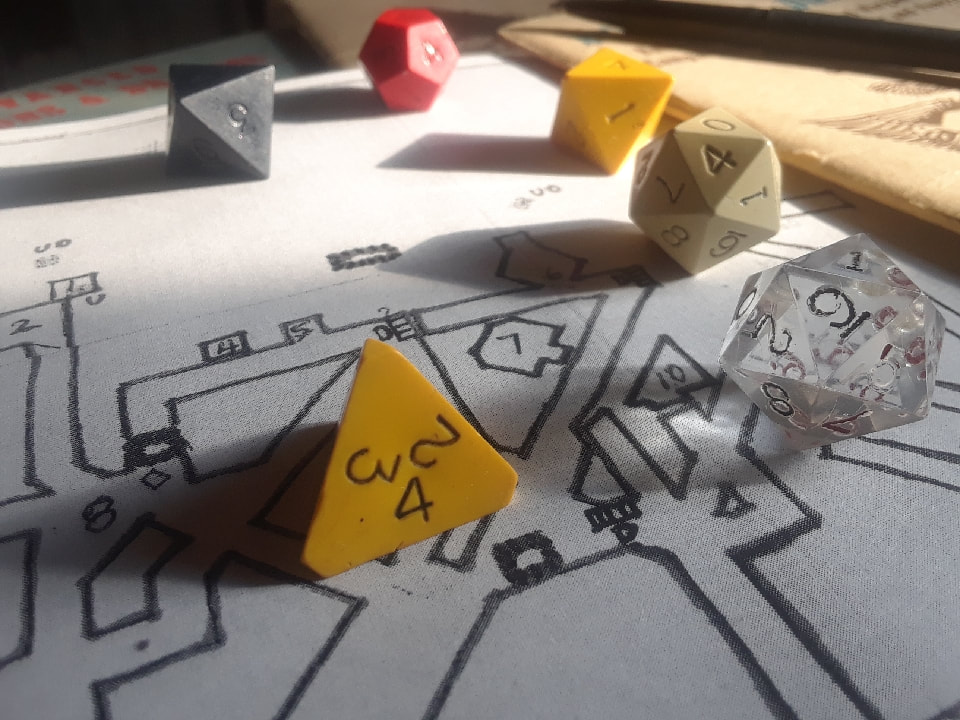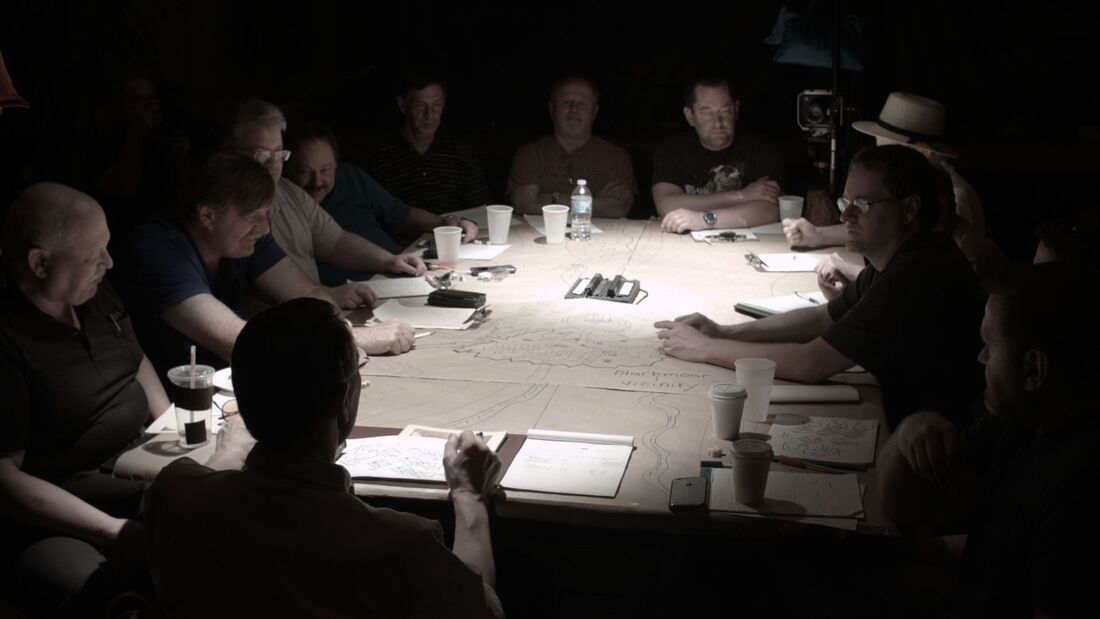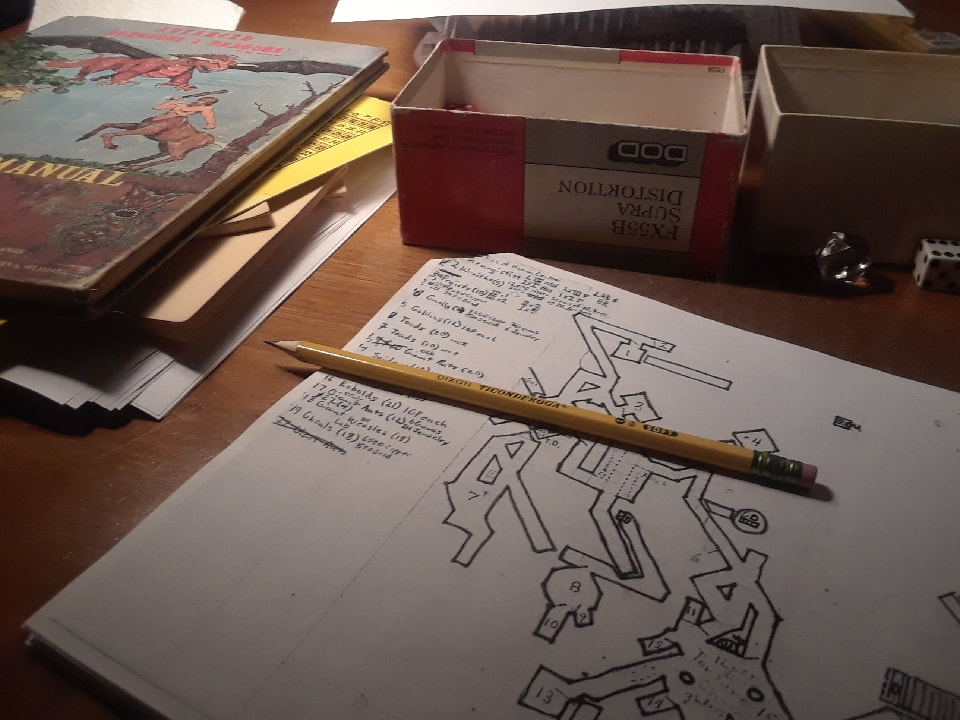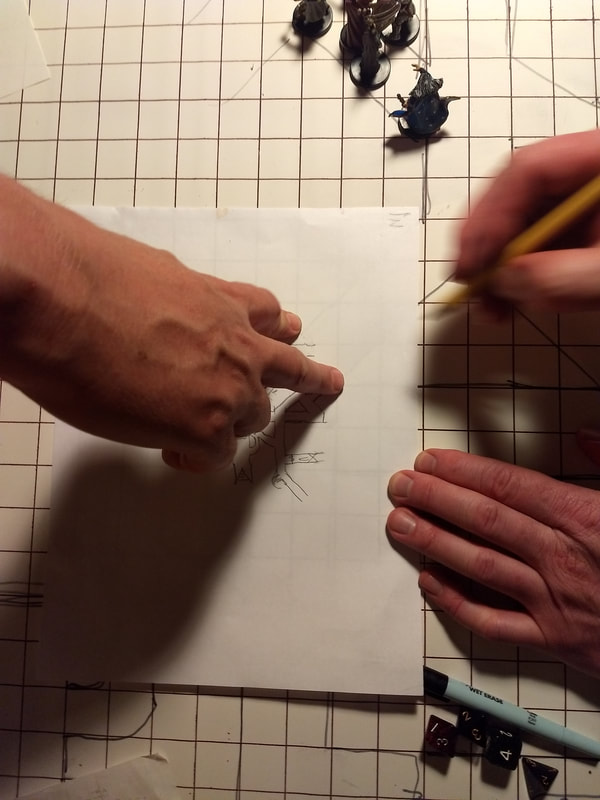|
Here I am sitting at the computer. I really should be working on work, but being the kind of scatter brained person that I am, I am thinking about methods for running Arc Story RPG campaigns. That's the thing, everyone I talk to wants to create an epic world setting, yet few people are focusing on how to do so. I've got some ideas that you may want to consider when creating your own world setting. Dave Arneson's Blackmoor Campaign is the first fantasy campaign ever, and is still being run to this day. Bob Meyer has taken over as the last Game Master. The very first session he ran for the Blackmoor Bunch began like so: "The King is Dead. There is chaos in the kingdom. The half men have taken over Blackmoor. The King's daughter needs help." This is Bob's opening statement and thesis about the game that is about to be played. It's only four sentences long, yet everyone knows what is going on in Blackmoor and what lies ahead for them. Because traditional play resides in team play, the focus of this story has nothing to do with each individual player. What matters most is the story of Blackmoor: What will happen to the realm? Has the Egg of Coot finally won the great war against the Barony of Blackmoor? Is there even a glimmer of hope for humanity? Even more pertinent: What is Bob doing as a referee? Blackmoor session being run by Bob Meyer, 2016 It's Not About You In my usual fashion I am going to begin by offending my readers. I feel this is the best way to get you to pay attention, read further, and possibly rage at me in the comments, or social media. Lets begin with you as a player character in an RPG. You are not Important. Contrary to contemporary RPG ideals about character fulfillment, and more importantly player fulfillment. The Arc Story Campaign has nothing to do with you as a character. Sure you become part of it, but it exists despite your character. Role Playing is not just your character talking to another character. It is the entirety of game reality. When you say "I open the door" you are role playing. You see, in Traditional Role Playing the focus is the in-game experience. This means everything within the RPG Game Engine construct, as Rob Kuntz has so kindly labelled it for us in his book, Dave Arneson's True Genius. The Game Engine is: the story setting; the spaces; the objects; the monsters and people and what they do. It is essentially everything you interact with when you play. The focus is not the characters. The Player's Character should be superfluous to the Arc Story. Thus, that 8 page back story you spent the weekend writing up; throw that puppy in the trash right now. No one cares that you were orphaned/ born a noble/actually are an outcast werewolf alpha - blah blah blah. Let me set something straight here, you are not the creator of the world story. The Referee is the one who sets the stage and they are the boss. If they walk out of the room, your game is over! If you want to argue this point with me, I will wave my wand of negation and tell you this: without a referee you aren't playing an RPG, you are playing something else, which is fine if that is what you like. Collaboration Ideally, one should confer with their Referee in order to establish a player character's background history so that it fits within the world story. A good Ref will let you be anything you want and work that into the existing world setting they have in mind. The injection of your character into a pre-existing world story needs to be a collaboration between the player and the referee. Yet character background should not be revealed to everyone right away. In real life people might meet you and ask what do you do? Well, the response is usually something about your work. In a fantasy world it's pretty clear who the fighters, and clerics, and wizards are. If you also happen to be the son of someone powerful, it may be in your best interest not to reveal that because you might risk being kidnapped for ransom. You Are Doing It Wrong I've watched a lot of referee's try to create Arc Story Campaigns over the years and more than once I've seen them fail. Failure can range through a variety of reasons, and can be a bit of mix and match. Here are some good examples. NERFing Your Way To Failure I had a close friend who wanted to run an epic adventure in hell, but all his player characters were low level. He needed high level characters to do the kind of game he wanted. Yet in those days we were sort of fixated on the idea of earning your experience levels. His cure was to run a low level campaign in order to LEVEL everyone up. Well, he really did not want anyone dying because he had to have his party of lords and wizards. This is when he began to NERF his game. No one could die no matter what kind of situation the players were in. Before long he was also handing out ridiculous magic items to his players in order to beef them up for their journey to hell. He really wanted to get his perfect dream campaign running at any expense. Despite all this wasted time in low level NERF world, I never heard of a hell campaign ever happening which is really kind of sad. A Simple Cure: GO STRAIGHT TO HELL! Give everyone a High Level Character with Magic Items to begin with, and just play an over the top game. Yup, no reason not to do this. The Perfect Dream Campaign Fail Admit it, as a Referee you want to create the RPG version of: ___place the name of your favorite fantasy book series here____. We all want to run the ultimate campaign. The thing is that being obsessed with this level of perfection will mean that you will never ever run this dream campaign. Nothing you do will be good enough for you. You will become That Ref, the one people meet in public who says things like: Yeah, the campaign is going awesome. Just spent 2 weeks writing up the background history on the gelatinous cube empire! Yet the problem here is that the OCD perfect Ref never actually runs anything in this perfect world. Most people who know this Ref write them off as a blow hard because all they do is talk about how perfect their campaign is going to be. And again, there is No Campaign! A Simple Cure: Just play. Begin a campaign and get your chops as a referee. Ref'ing takes time to learn, so do it now. As you play you can begin to add in your Arc Story. The Arc Story Bully This is yet another kind of Ref. They have actually created an Arc Story, but their entire premise is extremely complex and precise. It requires very specific events to occur in the right sequence for it to work. What they've done is more akin to writing a book. There is absolutely no space for players to actually play in this game. As a player you are now a spectator as the Referee walks you through their book. This Ref makes the players wear a straight jacket and literally bullies them through the story. Perhaps a more apt term for this is railroading? Along with these horrible Ref'ing traits, these kinds of Ref's also do a lot of NERFing and characters can never die because it doesn't fit the story; as it has been proclaimed that the wizard is destined to destroy the forces of evil and return the world back to normalcy. I have to rant a bit because I feel this is the worse kind of Arc Story Referee. The Bully Ref only cares about their story. The players aren't there to interact with the world. They are there to watch this Referee's genius at work and praise them for it. I drop out of campaigns like this the minute I detect the play style is happening because it is pure narcissism. A Simple Cure: Get over yourself. Learn to play well with others. Allow the players to do what they think is interesting even if it means going off script in your grand scheme for the world story. These are just a few ways that you can go completely off the rails when you design your huge arc story campaign. It comes from not being flexible enough to let your game concept create itself. You are not J.R.R. Tolkien. You do not have to sit down and write a massive manuscript ahead of time. That's right, your arc story will create itself. If you follow some core RPG story guidelines it actually just sort of happens by itself. The Launching Point An Arc Story is easier if your premise is simple like Bob's, "The king is dead…" - THAT'S IT! That is your core story element. Everything else will arise from this simple concept. If you keep it simple it allows for sub plots to get woven into the overall story and many of these will not be connected to each other. You can know there are 3 princes and one princess, yet what has yet to be discovered is that there is a bastard child that can legally vie for the throne. There is a struggle to see who will ascend the throne. Oh oh, maybe the players are somehow connected to court and there are rumors that the king was actually poisoned and did not die naturally, who is the culprit? What if a player is the bastard love child? Or better yet, thinks they are, but really aren't. Because the king has allies, these alliances are now in question. Will the new king, or Queen hold to these alliances, or will the new ruler desire conquest and greater power? A neighboring kingdom see's opportunity in the instability of the moment. They attack another kingdom in order to reclaim what they think is rightfully theirs. It helps to know the Motives for why people do things. Everyone has their own agenda and often everyone thinks they are working within their rights. Perhaps they aren't wrong either. Humans think they are the important part of this entire story, and yet... Thousands of years ago humans took advantage of a situation and moved into an area that was ruled by a race of faery creatures. The humans drove these creatures into hiding and took over their domain. Well, guess what, things are unstable again. The immortal faery race has been biding its time waiting for an opportunity. They have made alliances with other creatures from the wilderness domains. Their time has come! What is more, this part of history is ancient knowledge that has been forgotten by the mortal races. Perhaps one of the players finds an old scroll that reveals this story? As a referee you do not need to know every little detail of this story. All you need to know is that things have changed and things will continue to change. You just need a good set up for your world to come to life. In fact, with all that is going on, there are rumors that spies from the northern empire have been in your city asking questions. They are looking for something known as the Blood Seed Saphire. It is some kind of powerful artifact of unknown powers. Oh, hey, one of your players is in the market and bought some fish to eat, and the fishmonger wrapped it in some old parchment that happens to be an old map that reveals an underground maze with strange names and markings. What is this Stair of Whispers? Who are these Icicle Men? What is this Alter of the Diadem? Who would call a cave The Chamber of Dreams? Hmmm.. the Blood Seed Shrine? As you can see there is plenty for a group of players to investigate now. beginning with the large scale political maneuvering that is bound to impact the player's lives even if they ignore it. What if rumors begin to circulate that the eastern kingdom has been sacked and over-run by a Lich and his army of half men that came pouring out of another dimension into this world. Maybe the players get asked to cross over into that other dimension and steal something from the Lich in its own realm. Or, intrigue over an ancient artifact. Even what lies underground in an ancient catacomb can draw the players back into the larger story of war in the realms. What if the players accidentally end up in possession of the Blood Seed Saphire? If anyone finds out they have it, it could spell trouble. You can argue with me on this method for creating a campaign story line. Yet, my main objective is to point all of you Game Masters to how this is being created. Everything is being arranged so as to create potential. And this potential will lead to the creation of a story world. In fact, because everything is stated as an open ended situation, many of these story concepts will generate many other sub plots to the grand story. With this simple world premise "The king is dead..." you can now release your players into this world and they will begin to interact with it. They may even become the levers that move great powers and alter history. Your story is now fleshed out well enough that even if an entire party of characters gets killed on an adventure, the world just keeps existing and the movers and shakers in this world will keep on doing what they do. The story is not based on a single adventure concept, which often is so fixated in how the story needs to be played that it becomes a severe case of railroading. This world setting is now a living organism. Sorry, your party got that special artifact and then got killed on their way back to town - eh, tough luck! Yet the story must go on. Your players who died have now released the artifact into the world from its ancient resting place, surely someone will now have it in their possession and be using it for good or ill. See how this simply generates yet another story line within the world setting? Don't Seek Answers, Ask Questions!
Ask yourself questions that lead to story plots with no answer. Allow the answer to arise from in game actions by the players. Stay flexible in how you view this planned setting. Another big problem is that it's easy to become pinned on just one story theme. If you keep playing this game and keep asking questions, the natural outcome is that you end up with a lot of story ideas. They key is to focus on questions: What if unbeknownst to anyone, the princess is secretly studying the dark arts and plots to enslave and torture everyone at court? Ok, we have a Launch Point! Yet another weird plot twist for our world. Who knows maybe she will succeed and the players will be banished to the wilderness or risk death by staying in the town secretly waging war against the minions of the princess. Gee, I hadn't thought to have the entire kingdom fall under despotic rule, but it sure does pose some interesting possibility. Since the players do not know everything about this world, you can keep changing things and adding ideas as you think of them. Keep notes and keep scribbling. Your world is growing as your players are living in it. You will likely discover that this kind of story potential concept will lead you to create the most imaginative campaign setting your players have ever experienced. Now that Secrets of Blackmoor is finished we need help from all of you who have seen it. We aren't a huge movie company with lots of money for advertising. You won't be seeing Secrets of Blackmoor toys at the drive through. What will help this film's success is active participation by people like you. >>> vimeo.com/ondemand/sobfinal <<< Please Share this trailer link around. Post about the movie on your favorite gamer forums. Post about it to your gamer friends. Let us know where you talk about the movie, we'd love to come and join the conversation. We're just regular gamers like you. Thanks, Chris and Griff
13 Comments
S. VandenBerg
4/13/2020 03:41:50 am
Great thoughts!
Reply
Bob Meyer is an original Blackmoor player who was there in the very beginning when Arneson ran "a game of cards under a troll bridge" in 1971.
Reply
Cory Cepelak
4/13/2020 07:35:00 pm
This is helpful, I LOVE world building and character development, but I need to scale it back and just get some stuff up and playing.
Reply
he he he I mean that big movie companies that make big action movies do special marketing through fast food chains and offer happy meal toys as a way to promote their movie and get the word.
Reply
Ken St. Andre
4/14/2020 10:29:27 am
You are absolutely right about how to run a campaign or a game. Let the story develop out of the player actions, not some overwhelming desire of the GM to run Her perfect campaign. I'd be happy to game with you or Bob any time, even using TOG rules.
Reply
Thanks Ken,
Reply
4/14/2020 11:04:05 am
Fantastic advice. I was on the verge of starting a game in Feb. Then plague. So I'll be starting next week.
Reply
Marco Belletti
6/11/2020 12:21:28 am
Awesome post! I'm always charmed by the accounts of the "old ways".
Reply
I think every DM has their own way of keeping track of things.
Reply
Marco Belletti
6/11/2020 03:52:35 am
"Simple trap and monster ideas" sounds cool!
Pascal
5/6/2024 07:11:21 pm
Great advice! As player, I love to go to a place that exists in itself, like in the real world. Not a crafted mirror.
Reply
Griff
5/6/2024 10:11:43 pm
Thanks.
Reply
Leave a Reply. |
DVD'S, Books, T-shirts, games and more available on our store.
AuthorSecrets of Blackmoor is a Feature-length documentary about the birth of the “Mother of all Games;” Dungeons & Dragons. Archives
January 2024
Categories |
Privacy Policy
All Contents Copyright © 2023 The Fellowship of the Thing, Ltd. - All Rights Reserved
All Contents Copyright © 2023 The Fellowship of the Thing, Ltd. - All Rights Reserved






 RSS Feed
RSS Feed